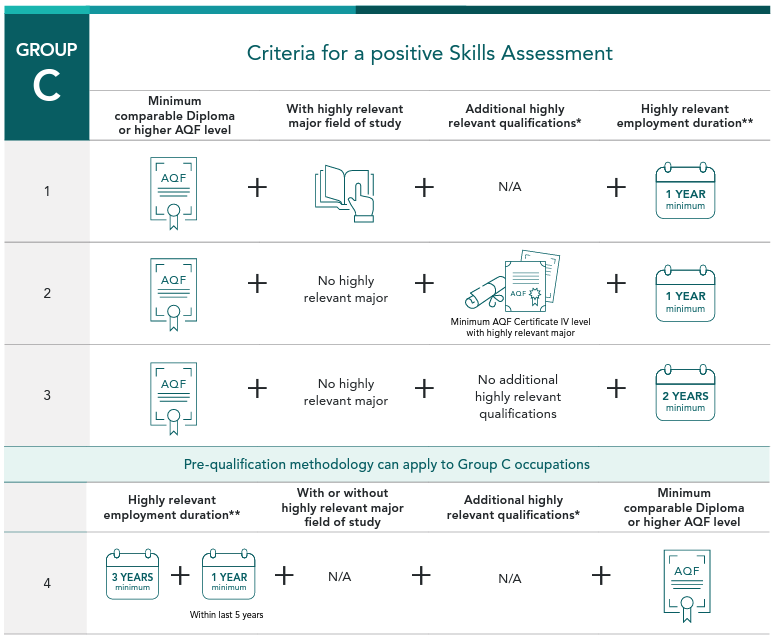An Agricultural Technician performs tests and experiments, and provides technical support to assist Agricultural Scientists in areas such as research, production, servicing and marketing.
Occupation description
An Agricultural Technician performs tests and experiments, and provides technical support to assist Agricultural Scientists in areas such as research, production, servicing and marketing.
Alternative Title:
- Agricultural Technical Officer
Occupations considered suitable under this ANZSCO code:
- Agriculture Laboratory Technician
- Artificial Insemination Technical Officer
- Dairy Technician
- Field Crop Technical Officer
- Herd Tester
- Horticultural Technical Officer
- Poultry Technical Officer
Occupations not considered suitable under this ANZSCO code:
- Agricultural Consultant
- Agricultural Scientist
- Science Technicians nec
These occupations are classified elsewhere in ANZSCO or are not at the required skill level.
Agricultural Technician is a VETASSESS Group C occupation
This occupation requires a qualification assessed as comparable to the educational level of an Australian Qualifications Framework (AQF) Diploma or higher.
Applicants can fulfil the assessment criteria for this occupation in four different ways.
*If employment is prior to the completion of the qualification at the required level, an applicant must have at least one year of highly relevant employment at an appropriate skill level within the last five years. The remaining three years of pre-qualifying period may be within the last ten years.
A positive assessment of both qualification level and employment duration is required for a positive Skills Assessment outcome.

* Additional qualifications in a highly relevant field of study include those comparable to the following levels:
- AQF Diploma
- AQF Advanced Diploma
- AQF Associate Degree or AQF Graduate Diploma
** Highly relevant paid employment duration (20 hours or more per week)
1-3
minimum years of employment highly relevant to the nominated occupation, completed at an appropriate skill level in the five years before the date of application for a Skills Assessment.
4
minimum 4 years of relevant employment required – Three years of relevant employment (can be outside the last 5-year period) in addition to at least one year of highly relevant employment within the last five years before applying.
Qualification and Employment Criteria
Employment
Highly relevant tasks include, but are not limited to:
- Examining topographical, physical and soil characteristics of farmland to determine its most effective use and identify nutrient deficiencies.
- Assisting in developing new methods of planting, fertilizing, harvesting and processing crops to achieve optimum land usage.
- Identifying pathogenic micro-organisms and insects, parasites, fungi and weeds harmful to crops and livestock, and assisting in devising methods of control.
- Analyzing produce to set and maintain standards of quality.
- Inspecting livestock to gauge the effectiveness of feed formulae.
- Assisting in controlled breeding experiments to develop improved crop and livestock strains.
- Arranging the supply of drugs, vaccines and other chemicals to Farmers and Farm Managers, and giving advice on their use.
- Collecting and collating data for research.
- Planning slaughtering, harvesting and other aspects of production processes.
- May advise producers on farming techniques and management.
*If employment is prior to the completion of the qualification at the required level, an applicant must have at least one year of highly relevant employment at an appropriate skill level within the last five years. The remaining three years of pre-qualifying period may be within the last ten years.
Employment information
Agricultural Technicians can work in research as well as commercial agriculture, horticulture and livestock production and servicing areas.
There are opportunities for Agricultural Technicians to learn on the job and contribute through technical expertise including modern agricultural practices, environmental management, intensive horticulture practices and advanced livestock production including breeding and artificial insemination.
Generally, Agricultural Technicians work in support of and assist Agricultural Scientists or equivalent experts.
Artificial Insemination Officer
The primary duty of an artificial insemination technician is to inseminate livestock in the hope of successfully impregnating the animals, but they may have many additional related responsibilities. Technicians must carefully monitor the heat cycles of female animals to determine the optimal time to inseminate (based on the animal’s ovulation cycle and behaviour). They also must carefully handle and thaw the straws of frozen semen that have been kept in liquid nitrogen storage. The insemination must be performed with both speed and accuracy to ensure that the animal has the best chance to become pregnant on a single service.
Supporting material for assessment
When applying for a Skills Assessment, please ensure you submit sufficient evidence supporting your proof of identity, qualification and employment claims. A full list of the documents required can be found on the VETASSESS website under Eligibility Criteria.
Get Support
Help with a Skills Assessment
Skills Assessment Support (SAS) services are for migration agents, legal practitioners and prospective applicants who are yet to submit their Skills Assessment application to VETASSESS.
Help with an urgent application
For general and professional occupations, priority processing can be used to fast-track urgent applications
How to apply
If you're a professional choosing to migrate to Australia, chances are you're likely to be assessed by us. We assess 360 different professional occupations, assessing your skills, experience and qualifications.
Find
Find the VETASSESS occupation that most closely fits your skills and experience.
Match
Match your skills and experience to your chosen occupation.
Prepare
Get ready to apply by preparing all the information and documents you need.
Apply
Apply online when you’re ready. If you’re still unsure, skills assessment support is available when you need it.